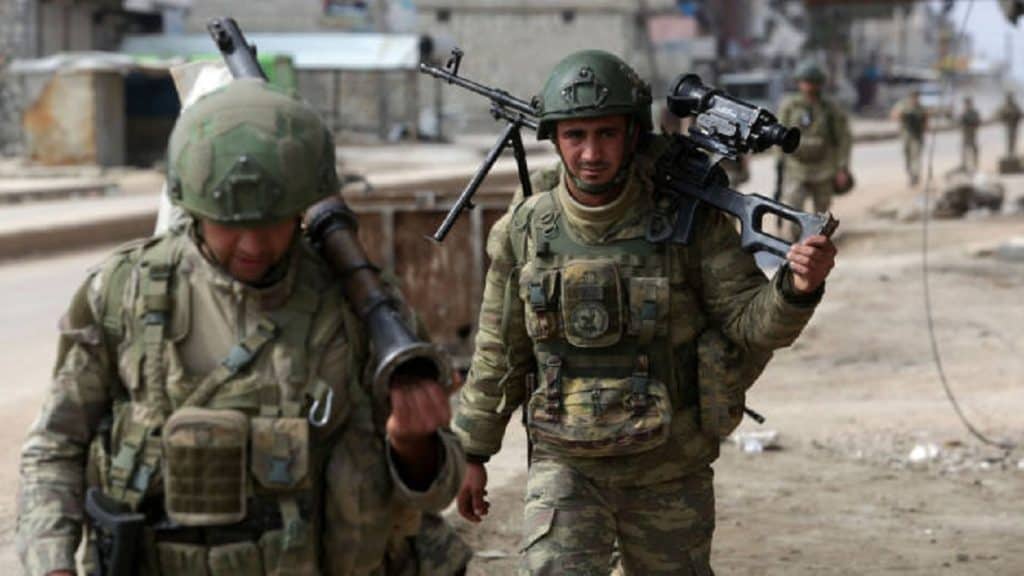By Denis Korkodinov
After the conclusion of the Moscow agreement on Idlib, Turkish President Recep Erdogan was in a very delicate situation. Operation Spring Shield did not lead to Turkish rule over northwestern Syria and the defeat of the Syrian Arab Army. However, as a result of the tension between Moscow and Ankara, the Turks in Idlib were at gunpoint of a Russian machine gun. And now their actions are limited only to the northern part of the M4 motorway, which causes serious concern in Turkey.
Recep Erdogan over the past 9 years has aimed to put pressure on the regime of Bashar al-Assad and occupy most of Syria. Nevertheless, if the military operations Euphrates Shield, Olive Branch and Source of Peace could somehow be justified by the struggle against the Islamic State and the Kurdish armed group YPG, then the Spring Shield operation causes all First of all, Turkish voters have more questions. Most Turks openly do not understand what is the motive for the actions of the Turkish army in Idlib, where there are neither Kurds nor ISIS. Now for Recep Erdogan, the problem is not in doubts about the conduct of hostilities in Syria or the distance from them. The problem is that the hostilities themselves have become very dubious.
It is worth noting that the conflict in northwestern Syria began after the Syrian Arab Army decided to finally suppress the last bastion of terrorism represented by the Khayyat Tahrir al-Sham group. This provoked resistance from Turkey, which refused to consider HTS as a radical opposition that posed a threat to Syria’s national security. In this regard, the “buffer zone” created by Ankara was used as a “security zone” for jihadists who from all over Syria rushed to Idlib under Turkish protection.
Russia, despite the reluctance to conflict with the North Atlantic Alliance, nevertheless began to exert pressure on pro-Turkish armed forces, thereby significantly facilitating the implementation of military missions for the Syrian Arab Army. This led to a direct conflict between Recep Erdogan and Vladimir Putin. Under pressure from Moscow, the Turkish leader was forced to accept the “Moscow ultimatum”, thereby saving his army in Idlib from total destruction.
The North Atlantic Alliance, contrary to Turkish expectations, is unlikely to help Turkey in accordance with Article 5 of the organization’s charter. The reason for this is not even that no one wants to enter into a direct military conflict with Russia, but because the leaders of the alliance do not see any prospect for the Turkish offensive. In addition, European countries are not ready to enter into the Syrian conflict without the guarantees of a blitzkrieg.
In the end, Turkey can expect the fate of the United States in Syria, which has almost completely lost control of the Syrian territories for the reason that they supported jihadists fighting the regime of Bashar al-Assad. Washington currently claims to be controlling oil fields in Syria. But this is not entirely true, since the American troops in Syria are actually under blockade and can not do anything if the Syrians decide to give them armed resistance.
The Spring Shield operation may become one of Turkey’s most expensive events, since the government forces of official Damascus and Moscow will spare no means to expel the Turks from Idlib and establish absolute control over the M4 highway. In this regard, Recep Erdogan will be forced to spend colossal amounts of money on a military campaign, which ultimately threatens Ankara with another economic default.
Recep Erdogan repeatedly failed to fulfill his promises made to Moscow, and quite often endangered Russian interests in Syria. It is therefore surprising that, until recently, Russia has shown restraint.
(The views expressed in this article belong only to the author and do not necessarily reflect the views of World Geostrategic Insights).







